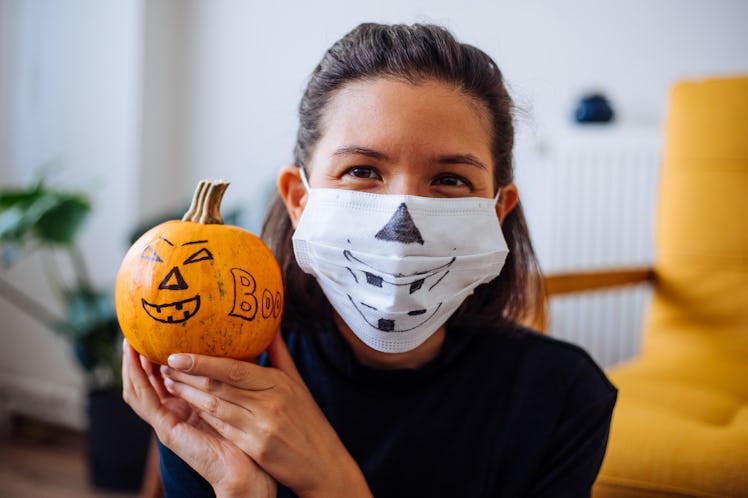
Here's What Experts Say About Wearing A Face Mask During Halloween Celebrations This Year
Celebrating Halloween as normal is not going to be an option during the coronavirus pandemic, but most experts aren’t forbidding spooky season fun altogether. You already know most of the safety precautions you should take to help control the spread of COVID-19, but you might be wondering how to apply that to Halloween. For example, do you need to wear a face mask to a Halloween party during coronavirus? Here are the precautions you should take during the spookiest night of the year.
Coronavirus guidelines from the U.S. Centers for Disease Control and Prevention (CDC) as of Sept. 21 urge people to reconsider taking part in traditional Halloween activities like trick-or-treating, attending indoor Halloween parties, going to indoor haunted houses, and going to rural areas outside of your community for common seasonal activities like apple picking, pumpkin patches, and hay rides. If you decide to attend a Halloween gathering this year, which the CDC designates as a moderate to high risk activity depending on how many people are present and if social distancing is observed, one of the best precautionary measures you can take is to wear a mask.
Rachael Piltch-Loeb, Ph,D, a preparedness fellow at Harvard's T.H. Chan School of Public Health, tells Elite Daily if everyone wears a face mask (not a Halloween costume mask), the transmission of the novel coronavirus is less likely for all parties involved. "Wear a mask indoors at a gathering with people you don't know or who have not been in your social bubble," Piltch-Loeb says. "Given that Halloween is a holiday where people tend to wear masks anyways, maybe incorporate it into your planned outfit."
According to a July 2020 study from UC Davis Health, wearing a mask over your nose and mouth reduces the risk of the wearer being exposed to the virus by 65%. It's important to wear a mask even if you don't think you have the virus, since people can be even more contagious before exhibiting symptoms.
While masks to prevent the spread of COVID-19 should be required for any gathering, traditional Halloween costume masks are not suitable substitutes. The face masks used to prevent the spread of coronavirus have been specifically constructed to limit how many respiratory particles can get through. According to the CDC, an acceptable mask must completely cover your mouth and nose without any gaps and must have at least two layers of breathable fabric.
If you do choose to wear a character mask with a traditional coronavirus face covering underneath, the CDC warns you should make sure you can breathe well when you double up. If you have trouble breathing with both masks on top, you should opt for a themed coronavirus mask instead.
Keeping any Halloween celebrations outdoors is key. Dr. John Swartzberg, M.D., F.A.C.P., clinical professor emeritus of infectious diseases and vaccinology at Berkeley Public Health, tells Elite Daily you should avoid holding a party indoors if possible. "An enclosed space with groups of people for long periods of time is a recipe for an outbreak," he says. Instead, you might want to consider holding your party outside and using heat lamps if you live in a place where it's necessary.
Dr. Swartzberg cites the CDC's recommendation for people who are 21 years old and can legally drink to avoid consuming too much alcohol, which can cloud your judgement and lead you to relax your coronavirus-related precautions.
If you must have a gathering indoors, which the CDC labels as a high-risk activity, Piltch-Loeb recommends foregoing tighter spaces like a dorm room and apartment in favor of large spaces that are not densely populated, such as a warehouse. "More space between people means that germs have space to fall to the ground and not get on your body," Piltch-Loeb explains.
When you're at a party, in addition to wearing a mask at all times, make sure you wash or sanitize your hands regularly, keep your distance, and avoid sharing drinks or food. As always, anyone experiencing symptoms of COVID-19 or who has come into contact with an infected person should quarantine themselves from others and not attend a Halloween party.
If you think you’re showing symptoms of coronavirus, which include fever, shortness of breath, and cough, call your doctor before going to get tested. If you’re anxious about the virus’s spread in your community, visit the CDC for up-to-date information and resources, or seek out mental health support. You can find all Elite Daily's coverage of coronavirus here.
Sources cited:
Rachael Piltch-Loeb, Ph,D, a preparedness fellow at Harvard's T.H. Chan School of Public Health
Dr. John Swartzberg, M.D., F.A.C.P., clinical professor emeritus at the UC Berkeley School of Public Health's Division of Infectious Diseases and Vaccinology
This article was originally published on